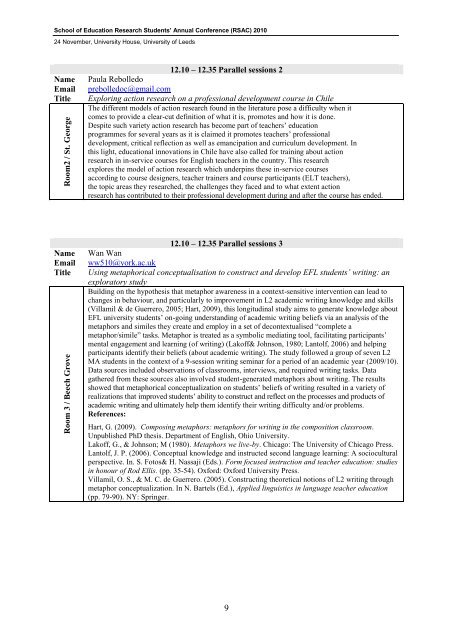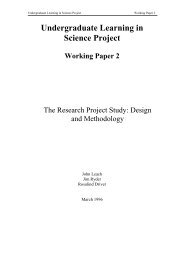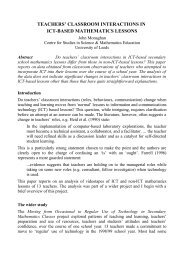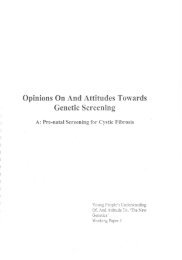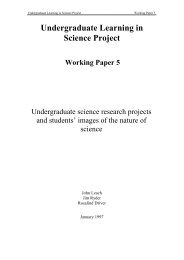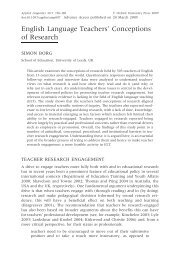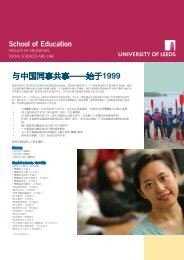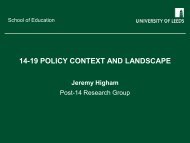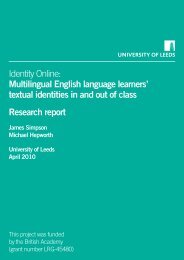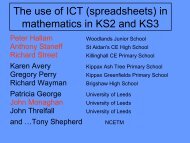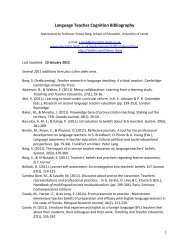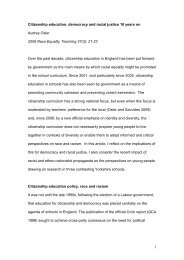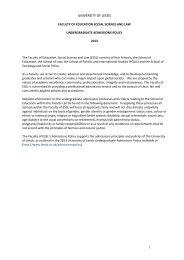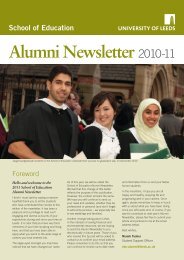Research Students' Annual Conference (RSAC) 2010 - School of ...
Research Students' Annual Conference (RSAC) 2010 - School of ...
Research Students' Annual Conference (RSAC) 2010 - School of ...
You also want an ePaper? Increase the reach of your titles
YUMPU automatically turns print PDFs into web optimized ePapers that Google loves.
Room 3 / Beech Grove<br />
Room2 / St. George<br />
<strong>School</strong> <strong>of</strong> Education <strong>Research</strong> Students’ <strong>Annual</strong> <strong>Conference</strong> (<strong>RSAC</strong>) <strong>2010</strong><br />
24 November, University House, University <strong>of</strong> Leeds<br />
Name<br />
Email<br />
Title<br />
12.10 – 12.35 Parallel sessions 2<br />
Paula Rebolledo<br />
prebolledoc@gmail.com<br />
Exploring action research on a pr<strong>of</strong>essional development course in Chile<br />
The different models <strong>of</strong> action research found in the literature pose a difficulty when it<br />
comes to provide a clear-cut definition <strong>of</strong> what it is, promotes and how it is done.<br />
Despite such variety action research has become part <strong>of</strong> teachers‘ education<br />
programmes for several years as it is claimed it promotes teachers‘ pr<strong>of</strong>essional<br />
development, critical reflection as well as emancipation and curriculum development. In<br />
this light, educational innovations in Chile have also called for training about action<br />
research in in-service courses for English teachers in the country. This research<br />
explores the model <strong>of</strong> action research which underpins these in-service courses<br />
according to course designers, teacher trainers and course participants (ELT teachers),<br />
the topic areas they researched, the challenges they faced and to what extent action<br />
research has contributed to their pr<strong>of</strong>essional development during and after the course has ended.<br />
Name<br />
Email<br />
Title<br />
12.10 – 12.35 Parallel sessions 3<br />
Wan Wan<br />
ww510@york.ac.uk<br />
Using metaphorical conceptualisation to construct and develop EFL students’ writing: an<br />
exploratory study<br />
Building on the hypothesis that metaphor awareness in a context-sensitive intervention can lead to<br />
changes in behaviour, and particularly to improvement in L2 academic writing knowledge and skills<br />
(Villamil & de Guerrero, 2005; Hart, 2009), this longitudinal study aims to generate knowledge about<br />
EFL university students‘ on-going understanding <strong>of</strong> academic writing beliefs via an analysis <strong>of</strong> the<br />
metaphors and similes they create and employ in a set <strong>of</strong> decontextualised ―complete a<br />
metaphor/simile‖ tasks. Metaphor is treated as a symbolic mediating tool, facilitating participants‘<br />
mental engagement and learning (<strong>of</strong> writing) (Lak<strong>of</strong>f& Johnson, 1980; Lantolf, 2006) and helping<br />
participants identify their beliefs (about academic writing). The study followed a group <strong>of</strong> seven L2<br />
MA students in the context <strong>of</strong> a 9-session writing seminar for a period <strong>of</strong> an academic year (2009/10).<br />
Data sources included observations <strong>of</strong> classrooms, interviews, and required writing tasks. Data<br />
gathered from these sources also involved student-generated metaphors about writing. The results<br />
showed that metaphorical conceptualization on students‘ beliefs <strong>of</strong> writing resulted in a variety <strong>of</strong><br />
realizations that improved students‘ ability to construct and reflect on the processes and products <strong>of</strong><br />
academic writing and ultimately help them identify their writing difficulty and/or problems.<br />
References:<br />
Hart, G. (2009). Composing metaphors: metaphors for writing in the composition classroom.<br />
Unpublished PhD thesis. Department <strong>of</strong> English, Ohio University.<br />
Lak<strong>of</strong>f, G., & Johnson; M (1980). Metaphors we live-by. Chicago: The University <strong>of</strong> Chicago Press.<br />
Lantolf, J. P. (2006). Conceptual knowledge and instructed second language learning: A sociocultural<br />
perspective. In. S. Fotos& H. Nassaji (Eds.). Form focused instruction and teacher education: studies<br />
in honour <strong>of</strong> Rod Ellis. (pp. 35-54). Oxford: Oxford University Press.<br />
Villamil, O. S., & M. C. de Guerrero. (2005). Constructing theoretical notions <strong>of</strong> L2 writing through<br />
metaphor conceptualization. In N. Bartels (Ed.), Applied linguistics in language teacher education<br />
(pp. 79-90). NY: Springer.<br />
9


